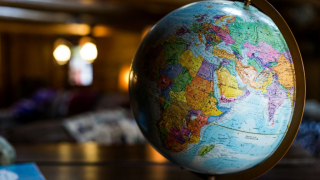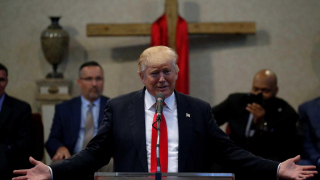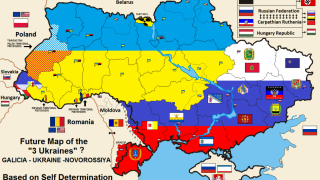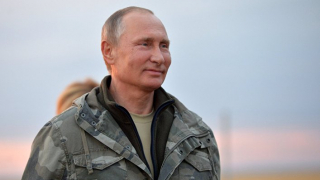The Inverted Nature of an Insular Hyperpower
The wars of Europeans throughout history, though occasionally affecting a global power balance, wrought their primary destruction within Europe itself. Offensive warfare necessitated a believable casus belli because citizens could not shield their eyes from the destruction that war brought to their own homes. The rapid expanse of military capabilities following the Second World War was not purely one of destructive capabilities, but one of global reach. The development of missiles that could strike anywhere, bombers that could circumnavigate the globe, and submarines that could lurk undetected for months at a time created a nightmare scenario where superpowers could wage wars far from home with no consequences to themselves. Made even more dangerous by the fact that one of the surviving superpowers that came out of the 2nd World War was not located on the Eurasian World Island, but instead in the Insular as an inversion of the geopolitical realities of nations bound to the World Island.
Due to the interconnectedness of all nations on the World Island, no nation can behave as if they live in a vacuum, and the geopolitical framework informs all political decisions. The most visceral example of this is the cultural shift in how people relate to the morality of warfare. Western Europeans saw first-hand the destructive results of two World Wars; both of which resulted only in the minor reshuffling of disputed borders. For all the sacrifices made by the French and the British between 1914 and 1945, they gained very little. It is no wonder then that many Western Europeans have lost the appetite for warfare. The gains they made from winning both global conflicts were simply not enough to justify the losses they endured.
The Soviet Union exists as a special case; in the process of winning World War II, the Soviets paid a greater price than any other nation in the history of warfare. Death came to every city, both in the loss of young men, but also in the destruction of cities themselves. The Soviet people were disgusted by the cruelties of war but did not lose their willingness to engage in the sacrifice inherent to warfare because their war was not one over resources, politics, or border disputes, but one of survival.
Had Germany won the Second World War, the existence of the French identity or the British identity would not have been in danger. Of course, Germany would have taken her share of spoils, and both nations would likely have found themselves junior partners in a domineering relationship with Germany, but the fabric of what it meant to be a Frenchman (language, culture, religion, etc.) would not have been destroyed.
Contrast this to the threat that loomed over the Soviet Union. Had Germany won the war what it meant to be Soviet (and more ethnologically what it meant to be Russian, Belorussian, etc.) would have been changed forever, if not simply destroyed.
This critical difference in the memory of warfare leads to a general consensus regarding the nature and morality of conflict that differs greatly between East and West. While both sides recognize the horrors of war, no Russian would ever say that the sacrifices made in war were not worth it, whereas the British and French would give pause to consider, and many will say that the sacrifices of prior generations were pointless.
Both of these views though still differ from the American perspective on warfare. As the sole superpower of the Insular, America was able to triumph over Germany without any losses to her homeland. The First and Second World Wars were fought overseas, and no bombs or missiles fell on the continental United States. Regular Americans could continue about their lives without significant disruption and combat deaths, though numbering in the hundreds of thousands, were remote and represented less than one half of one percent of the American population. Many people would have gone through the entire war having lost no friends or loved ones, and their appetite for war was still unsatiated.
This, combined with the rapid development of technology in the latter half of the 20th century, should have led to the greatest war ever seen by mankind, and yet, the rest of the 20th century saw no global conflict.
The World Island was still firmly held by the Soviet Union, whose power emanated from the Eurasian Heartland. This global power pivot point countered the ability of the United States to deliver war unto the World Island from the safety of the Insular (as she had done in both World Wars). The diametric opposition of these unipolar powers in their respective spheres was not something that developed by chance but rather was necessitated by the very real threat of global armageddon. Global peace existed solely on the balance between these superpowers and the geopolitical realities imposed by their locations on the globe.
Though master of the oceans and safe in the Insular, the United States lacked the ability to act unilaterally, as any act of attempted expansion would be countered by a Soviet response. American missiles in Turkey were met with Soviet missiles in Cuba; the build-up of NATO was met with the birth of the Warsaw Pact; American nuclear stockpiles only encouraged the further growth of Soviet nuclear stockpiles. Each geopolitical pole was bound inextricably to the actions of her counterpart. An important facet of what it meant to be American (a nation without a specific race, religion, or ethnic-group as its founding principle) was to be in opposition to the “Soviet way”.
The greatest example of this antipolar system can be seen in the development of the mutually assured destruction (MAD) doctrine. Massive nuclear stockpiles ensured that any significant conflict would lead to, as per the name, the mutually assured destruction of all major world powers. It was in the best interest of both nations to avoid committing to wars further than providing training and limited military aid. The United States did not engage in any unilateral conflicts during the Cold War. Vietnam, while brutal, was still a war waged on behalf of a local partner (South Vietnam). But everything changed with the fall of the Berlin Wall and the end of the Cold War. The United States, now the unipolar hyperpower on the world stage, engaged in several conflicts as the primary combatant.
The Invasion of Panama (1989)
The Gulf War (1990)
The Intervention in Haiti (1994)
The Invasion of Afghanistan (2001)
The Iraq War (2003)
And innumerable other conflicts as a supporting party (Somalia, Bosnia, etc.)
The above list is not meant to be a slight or to say that any citizenry is unnaturally inclined to seek conflict. Instead, it is purely the recognition of one simple truth: Man is a rational animal.
When the benefits of an option outweigh the cost, it is only logical that man will engage in warfare. And as stated, the power dynamics created by an Insular nation who has both the technology to wage war into the World Island, and lacks an antipolar superpower to make that politically untenable, will lead to an increasingly conflict-ridden world as the Insular power attempts to invert the natural hierarchy granted to us by the normative geopolitical system present throughout much of history.
Any nation that attempts the great leap between regional power and superpower on the Eurasian World Island will come into direct political conflict with the Insular antipolar power. Though religion, politics, or history may be used to retroactively justify this future conflict, the root cause will inherently be that an Insular power cannot exert her influence directly into the World Island if a Heartland superpower exists to counter any such actions.
This stage, the leap between regional power and superpower, is the most dangerous temporal state for a nation to exist in. Their ambitions will bring them into conflict, but their economic and military might is still not at a point where they can directly counter the Insular superpower’s grip. The superpower will attempt to destabilize the rise of these intermediate powers through the application of both economic and eventually military pressure as they near the threshold of superpower status. It is therefore in the interest of any nation attempting the great leap to move as rapidly as possible through this proverbial state of limbo; the longer they remain in this state, the more they expose themselves to negative geopolitical consequences.
The only two nations with a believable chance of making such a leap are the Russian Federation and The People’s Republic of China; both of which have increasingly come into political conflict with the United States as their own powers have grown. The United States will predictably try to provoke conflict on the borders of both of these powers in order to destabilize them and (ideally in the mind of the United States’ political elite) bring them into direct conflict with one another.
But man is rational; he will not engage in conflict if he believes it is not in his own best interest. People who seek long-term peace must therefore support the rapid expansion of a Eurasian superpower who can counter the political, technological, and military might of the Insular hyperpower and make violent conflict a politically untenable solution for all global powers.














